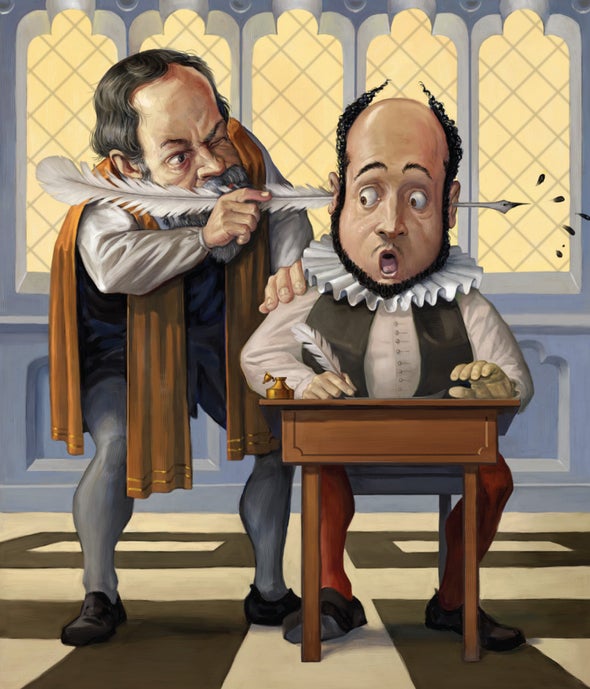Galileo could be, let's say, prickly. “Look, he was a genius, and he was a truly unusual person, but he wasn't exactly nice,” astrophysicist and author Mario Livio, whose latest book is Galileo and the Science Deniers, said by phone. “He was nice to his family, he supported the members of his family ... and he had a few extremely good friends. But he could be nasty to his enemies. His sharp pen was just incredible.”
The great man shared his lifetime with many people whose understanding, if you can call it that, of the laws of nature was strongly influenced by antiquity's often wrong writers. (You also share your stay on Earth with such individuals.) One such contemporary was a Jesuit priest and scientist named Orazio Grassi, who was known to mix it up in print with Galileo on numerous occasions.
Galileo really didn't like this guy. When he read a Grassi lecture about comets, he wrote margin notes that included pezzo d'asinaccio (“piece of utter stupidity”), bufolaccio (“buffoon”) and balordone (“bumbling idiot”). I include the original Italian because, hey, don't be a jadrool.
In another work, Grassi, in theorizing about heat, relied on those ancient authors when he claimed that Babylonians could cook eggs by whirling them around at the ends of slings. Livio writes that “Galileo pounced on this fallacy like a cat on a slow mouse.” Galileo's retort, written with that aforementioned sharp pen in a work called The Assayer, translates to: “If we do not achieve an effect which others formerly achieved, it must be that we lack something in our operation which was the cause of this effect succeeding, and if we lack one thing only, then this alone can be the true cause.”
The ball thus teed up, Galileo swings away: “Now we do not lack eggs, or slings, or sturdy fellows to whirl them, and still [the eggs] do not cook, but rather cool down faster if hot. And since we lack nothing except being Babylonian, then being Babylonian is the cause of the egg hardening.” You could say this reductio ad absurdum left Grassi shelled.
“The more I thought about Galileo and his personality and his fights,” Livio told me, “I realized how relevant his fight for intellectual freedom and against science deniers is for today, when we are really facing rampant science denial on many fronts.”
Current investigators don't typically have to face the possibility of torture, as Galileo did from the Catholic Church for being “vehemently suspect of heresy.” But modern climate researchers, evolutionary biologists and educators are threatened via e-mail and pilloried in social media, sometimes by elected officials.
In 2012 two conservative outlets charged usually respected Penn State climatologist Michael E. Mann with disseminating fraudulent data (and compared him to a pedophile). Mann sued for defamation, and the case is still unresolved. Worse than the personal attacks, of course, is that policy is being made based on nonsense and magical thinking. (I'm writing this in early May. Has the coronavirus just, poof, gone away yet?)
It's an almost comical irony that today's deniers try to assume the mantle of Galileo: people who disagree with the scientific consensus on things such as climate sometimes cite Galileo as a rebel (you know, like themselves) who is now seen as a hero.
“It's really a logical fallacy,” Livio said. “Oh, look, here was one who was going against the mainstream, and it turned out to be right; therefore, those few who speak against climate change are right. Galileo was right not because he was one against many—he was right because he was right.”
By this point Livio was laughing: “It's not the case now every time that one speaks against the mainstream, he or she is right. Most of the time those people are wrong. In some rare cases, they are right. So to bring that as an argument is just ridiculous.” Sadly, two arguments of very different weights can still convince a lot of people at the same rate.

